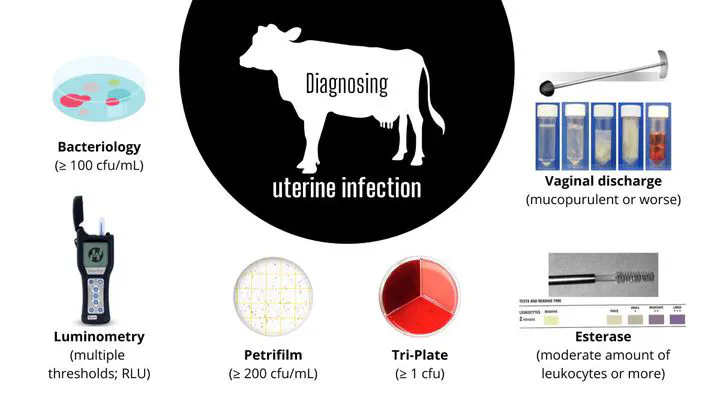Validity of purulent vaginal discharge, esterase, luminometry, and bacteriological tests for diagnosing uterine infection in dairy cows
Jun 1, 2025· ,,,,,,·
0 min read
,,,,,,·
0 min read
José Denis-Robichaud
Nicolas Barbeau-Grégoire
Marie-Lou Gauthier
Simon Dufour
Jean-Philippe Roy
Sébastien Buczinski
Jocelyn Dubuc

Abstract
This prospective cross-sectional study aimed to evaluate the ability of laboratory bacterial culture, Petrifilm, Tri-Plate, luminometry, purulent vaginal discharge (PVD), and esterase to correctly identify uterine infection in dairy cows, and to assess these tests’ usefulness in different situations. We sampled dairy cows between 29 and 43 days in milk in seven farms. We considered all six tests imperfect to identify uterine infection and used Bayesian latent class analyses to estimate their sensitivity and specificity. We created ten scenarios, including tests alone, in series, or in parallel, and we calculated predictive values and misclassification cost terms (MCTs). All estimates are presented with 95% Bayesian credibility intervals (BCI). A total of 326 uterine samples were collected. The laboratory culture had the best validity (sensitivity = 0.87, 95% BCI = 0.77–0.97; specificity = 0.71, 95% BCI = 0.58–0.86). The other tests had similar specificity but lower sensitivity, with PVD having the lowest sensitivity (0.05, 95% BCI = 0.01–0.10). If treating a healthy cow was considered worse than leaving a cow with a uterine infection untreated, luminometry yielded an MCT similar to the laboratory culture. These findings highlight that the on-farm tools currently used to identify cows that could benefit from intrauterine antimicrobial treatment do not identify uterine infection accurately. While the laboratory culture was the most accurate test, it cannot easily be implemented on farms. Luminometry’s validity was good, but additional research is necessary to understand how it can be implemented to improve judicious intrauterine antimicrobial use.
Type
Publication
Preventive Veterinary Medicine